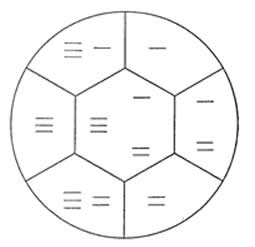
§2. The Seven Systems of Metaphysics
77. The three categories furnish an artificial classification of all possible systems of metaphysics which is certainly not without its utility. The scheme is shown in this figure (p. 53). It depends upon what ones of the three categories each system admits as important metaphysico-cosmical elements.
78. One very naturally and properly endeavors to give an account of the universe with the fewest and simplest possible categories.
Praedicamenta non sunt multiplicanda praeter necessitatem.

79. We ought therefore to admire and extol the efforts of Condillac and the Associationalists to explain everything by means of qualities of feeling [i]. If, however, this turns out to be a failure, the next most admirable hypothesis is that of the corpuscularians, Helmholtz and the like, who would like to explain everything by means of mechanical force, which they do not distinguish from individual reaction [ii]. That again failing, the doctrine of Hegel is to be commended who regards Category the Third as the only true one [iii]. For in the Hegelian system the other two are only introduced in order to be aufgehoben. All the categories of Hegel's list, from Pure Being up, appear to me very manifestly to involve Thirdness, although he does not appear to recognize it, so immersed is he in this category.
80. All three of these simplest systems having worked themselves out into absurdity, it is natural next in accordance with the maxim of Parsimony to try explanations of the Universe based on the recognition of two only of the Categories.
81. The more moderate nominalists who nevertheless apply the epithet mere to thought and to representamens may be said to admit Categories First and Second and to deny the third [i ii]. The Berkeleyans, for whom there are but two kinds of entities, souls, or centres of determinable thought, and ideas in the souls, these ideas being regarded as pure statical entities, little or nothing else than Qualities of Feeling, seem to admit Categories First and Third and to deny Secondness, which they wish to replace by Divine Creative Influence, which certainly has all the flavor of Thirdness [i iii]. So far as one can make out any intelligible aim in that singular hodge-podge, the Cartesian metaphysics, it seems to have been to admit Categories Second and Third as fundamental and to deny the First [ii iii]. Otherwise, I do not know to whom we can attribute this opinion which certainly does not seem to be less acceptable and attractive than several others. But there are other philosophies which seem to do full justice to Categories Second and Third and to minimize the first, and among these perhaps Spinoza and Kant are to be included.


